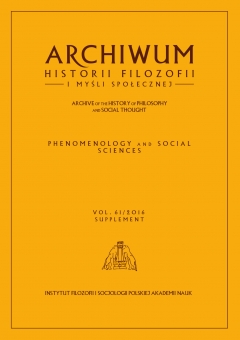The Phenomenological Critique of Law according to Simone Goyard-Fabre
The Phenomenological Critique of Law according to Simone Goyard-Fabre
Author(s): Maria GołębiewskaSubject(s): Anthropology, Philosophy of Law, Phenomenology
Published by: Instytut Filozofii i Socjologii Polskiej Akademii Nauk
Keywords: phenomenology of law; transcendental subject; transcendental function of consciousness; world of law; legal experience; normativity; normativeness;
Summary/Abstract: Simone Goyard-Fabre is the author of many books on the philosophy of law. The publication that deserves special attention is her book concerning the phenomenological assumptions of law and normativity in general – Essai de critique phénoménologique du droit. She provides arguments for anthropological conditions of every normativity, including the order of legal norms. The point of reference for her theses about the phenomenology of law is Husserl’s concept of the transcendental subjectivity, in which she finds the validation of the rational and necessary character of normativity that is both found and established by people. In her concept, law is presented as a structured regular product of consciousness (of the transcendental subjectivity) that constitutes the meaning of “legal experience” in accordance with some internal aprioristic necessity. Goyard-Fabre combines references to Husserl’s phenomenology and to Kant’s legalism – i.e., the concepts that largely elevate rational and anthropological qualities of human achievements – with a critique of legal voluntarism. She disputes with legal positivism and legal constructivism, according to which legal reality is entirely ideal, because it is constructum, fiction. Goyard-Fabre emphasises the double “mixed” nature of every law, where the normative rational rule and the existing fact meet. She refers to Husserlian concept of Lebenswelt, describing this intersubjective “lifeworld of experience” as a permanent horizon of legal consciousness. Legal intentionality is one of many kinds of intentionality – the “reflexive consciousness of life”. Law is the “modality of human life” and belongs to it essentially, disclosing its essential source thanks to the revelation of the “transcendental constitution of what is legal”, i.e., the anthropological and spiritual source of any normativity that is available to us and recognised by us.
Journal: Archiwum Historii Filozofii i Myśli Społecznej
- Issue Year: 2016
- Issue No: 61supl.
- Page Range: 149-163
- Page Count: 15
- Language: English

